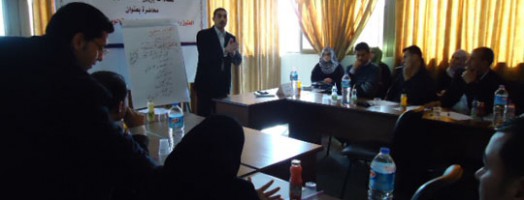Rights and Freedoms: Access to Information in the Palestinian Territories
The presentation was made by Mr. Bakr Turkmani, Legal Advisor to the Gaza-based Office of the Coalition for Integrity and Accountability (AMAN).
Having welcomed the speaker and audience, Mrs. Lina at Tounisi, Coordinator of the IoL Gaza Office,
explained that the legal encounter would contribute to promoting rights and freedoms in Palestine, most notably the right to access information.
Mr. Turkmani explained that the right to access information “is a citizen’s right to request and receive answers about any piece of information in a printed, written or other form from any institution.” Restrictions are imposed on the right to access information with a view to safeguard national security or dignity of persons. International conventions and domestic regulations, which govern the right to access information, include the Universal Declaration of Human Rights, as well as the Palestinian Basic Law, Law on Printed Materials and Publication, Election Law, etc.
Stressing significance of the right to access judicial information, Mr. Turkmani provided an overview of relevant laws and restrictions, roles of judicial bodies, and public oversight on the Judicial Authority. To delineate the relation between the right to access information and freedom of expression, Mr. Turkmani explained that social media, including Facebook, poses three challenges: (1) volume of information accommodated; (2) information released; and (3) type of information. Although it safeguards the freedom of expression, not all that is published on social media outlets is necessarily correct. In this vein, what controls ensure the legal protection of the right to access information? Indicators used to gauge the freedom of information include operative legislation, public freedom to access information, multiple sources of information, specific mechanisms and directives to regulate access to information, and media freedom.
In the Palestinian context, Mr. Turkmani highlighted that the Executive monopolises information management and evaluation. Operations of the Palestinian Information Centre should also be streamlined.
In the ensuing discussion, participants proposed that sessions of the Palestinian Legislative Council and Council of Ministers should be public. To distinguish between public and private information, no one is entitled to access personal information except by permission from the Public Prosecution. In addition to promoting accountability, hearing sessions will be organised and a campaign launched to raise public awareness about the right to access information.
The legal encounter brought together interested individuals and representatives of several organisations.
The event was organised in partnership with the Konrad Adenauer Stiftung.











